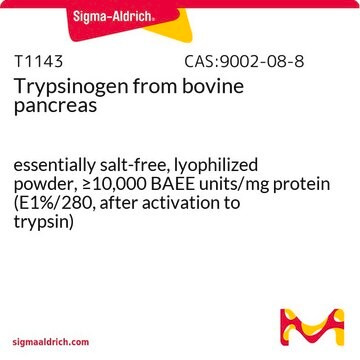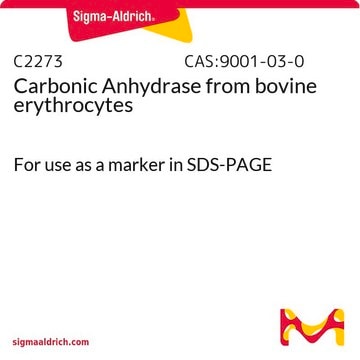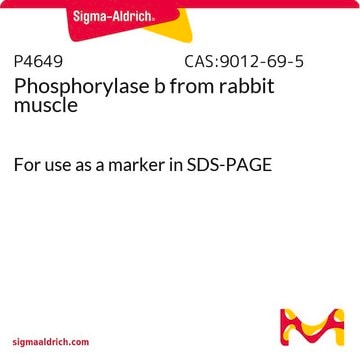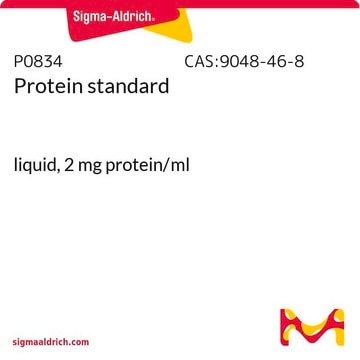T9011
Trypsinogen, PMSF treated from bovine pancreas
For use as a marker in SDS-PAGE
Anmeldenzur Ansicht organisationsspezifischer und vertraglich vereinbarter Preise
Alle Fotos(1)
About This Item
Empfohlene Produkte
Biologische Quelle
bovine pancreas
Qualitätsniveau
Form
powder
Mol-Gew.
~24 kDa
Verpackung
vial of 25 mg
Anwendung(en)
detection
Lagertemp.
2-8°C
Anwendung
Trypsinogen, PMSF treated from bovine pancreas has been used as a non-phosphorylated control to analyze the phospho-protein α-casein from bovine milk by sodium dodecyl sulfate-polyacrylamide gel electrophoresis (SDS-PAGE). It has also been used as a molecular weight marker standard in SDS-PAGE.
Biochem./physiol. Wirkung
Trypsinogen is a pancreatic proteinase and exists as isoenzymes 1 and 2. It is an inactive precursor of trypsin and gets activated by the enteropeptidase found on the brush border membrane of enterocytes in the duodenum. It is also known to proteolytically activate itself. Trypsinogen activation is associated with acute pancreatitis as it causes pancreatic enzyme cascade which activates the remaining zymogens leading to autodigestion of the neighboring tissue. Hereditary pancreatitis was shown to be caused by a Arg-His substitution at residue 117 of trypsinogen causing auto-activation of trypsinogen to trypsin.
Lagerklassenschlüssel
11 - Combustible Solids
WGK
WGK 3
Flammpunkt (°F)
Not applicable
Flammpunkt (°C)
Not applicable
Persönliche Schutzausrüstung
Eyeshields, Gloves, type N95 (US)
Analysenzertifikate (COA)
Suchen Sie nach Analysenzertifikate (COA), indem Sie die Lot-/Chargennummer des Produkts eingeben. Lot- und Chargennummern sind auf dem Produktetikett hinter den Wörtern ‘Lot’ oder ‘Batch’ (Lot oder Charge) zu finden.
Besitzen Sie dieses Produkt bereits?
In der Dokumentenbibliothek finden Sie die Dokumentation zu den Produkten, die Sie kürzlich erworben haben.
D C Whitcomb et al.
Nature genetics, 14(2), 141-145 (1996-10-01)
Hereditary pancreatitis (HP) is a rare, early-onset genetic disorder characterized by epigastric pain and often more serious complications. We now report that an Arg-His substitution at residue 117 of the cationic trypsinogen gene is associated with the HP phenotype. This
Unser Team von Wissenschaftlern verfügt über Erfahrung in allen Forschungsbereichen einschließlich Life Science, Materialwissenschaften, chemischer Synthese, Chromatographie, Analytik und vielen mehr..
Setzen Sie sich mit dem technischen Dienst in Verbindung.






